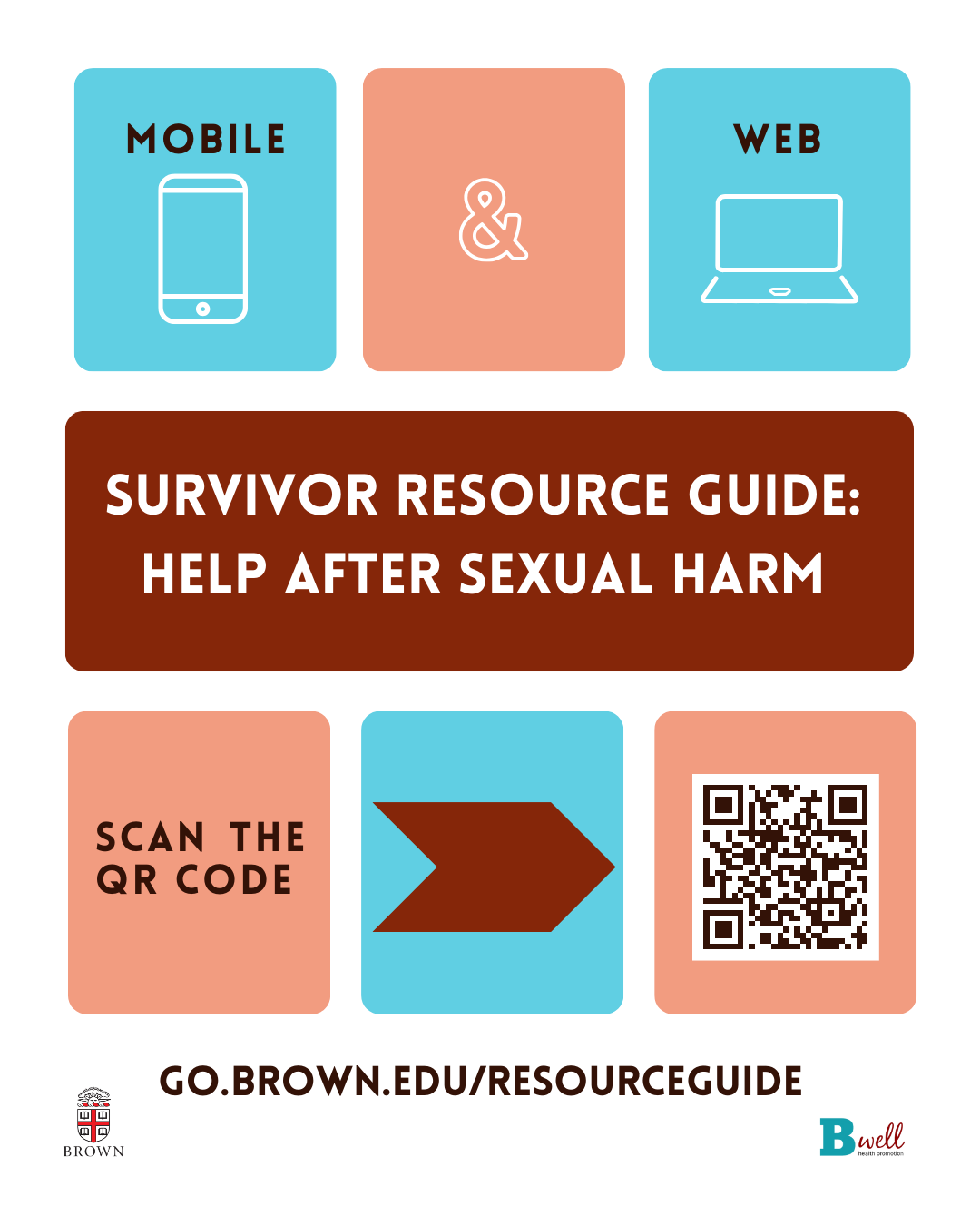The University takes sexual harassment very seriously, and there are many resources on campus to address this problem. This page focuses on providing information and resources for students. For a more detailed discussion of these policies, you can refer to the Title IX website.

Get Help
Sexual Harassment
What is sexual harassment?
Federal law (Title IX of the Education Amendments of 1972) protects students from unlawful sexual and gender-based harassment in all school programs and activities. Brown's Title IX Policy defines sexual and gender-based harassment as follows:
Sexual Harassment is any unwelcome sexual advance, request for sexual favors, or other unwanted conduct of a sexual nature, whether verbal, non-verbal, graphic, physical, electronic, or otherwise, when one or more of the following conditions are present:
(i.) Submission to or rejection of such conduct is either an explicit or implicit term or condition of, or is used as the basis for decisions affecting, an individual’s employment or advancement in employment, evaluation of academic work or advancement in an academic program, or basis for participation in any aspect of a Brown University program or activity (quid pro quo); and/or
(ii.) Such conduct has the purpose or effect of unreasonably interfering with an individual’s learning, working, or living environment; in other words, it is sufficiently severe, pervasive, or persistent as to create an intimidating, hostile, or offensive learning, working, or living environment under both an objective and subjective standard (hostile environment).
Gender-Based Harassment includes harassment based on sex or gender, sexual orientation, gender identity, or gender expression, which may include acts of intimidation or hostility, whether verbal or non-verbal, graphic, physical, or otherwise, even if the acts do not involve conduct of a sexual nature.
The policy also lists examples of behaviors that could fall under the category of sexual or gender-based harassment:
-
Inappropriate physical conduct, including unwelcome touching or sexual advances within the working, living, or learning environment;
-
Persistent and inappropriate personal attention from one colleague to another in the face of repeated rejection;
-
Inappropriate verbal conduct, including lewd or sexually suggestive comments, jokes, or innuendoes, or unwelcome comments about an individual’s sexual orientation, gender, gender identity, or gender expression; or
-
Inappropriate written conduct, including letters, notes, or electronic communications, containing comments, words, jokes, or images that are lewd or sexually suggestive or relate in an unwelcome manner to an individual’s sexual orientation, gender, gender identity, or gender expression.
Who can be a victim of sexual harassment?
Anyone can be a victim of sexual harassment regardless of gender or gender identity. The victim does not have to be the person directly harassed but could be anyone affected by the offensive conduct.
Who can be a sexual harasser?
The harasser may be a person of any gender identity. Sexual harassment may occur between any members of the Brown community, for example, between faculty and students, faculty and faculty, students and staff, and student and student. While sexual harassment often occurs when there is a power differential, it can also happen between peers or colleagues where there is no power difference.
Can one incident constitute sexual harassment?
It depends. In "quid pro quo" cases, a single sexual advance may constitute harassment if it is linked to the granting or denial of employment or educational advancement. In contrast, a single incident of offensive sexual conduct or remarks generally does not create a "hostile environment." A hostile environment claim usually requires a showing of a pattern of offensive conduct. However, a single incident that is severe could create a hostile environment.
It is important to remember that every situation is unique and needs to be evaluated based on several factors, including the nature of the behavior, the frequency and context of the behavior, and the relationship between the people involved. Because of this, we recommend talking to any one of the resources listed below so that you can better understand the situation, your options and your rights.
What can I do to prevent sexual harassment?
We can all step in to ensure that our community is more free from harassment. If you notice that someone is uncomfortable with comments that someone else is making, you can:
-
Interrupt or distract in the moment; and/or engage your peers or authorities all while keeping in mind your own safety and the safety of the victim in the situation.
-
Again, considering your own safety and the safety of the victim, first, you can also pull aside the person who is harassing and ask them to discontinue the behavior depending on your relationship and power to influence the situation.
-
Take proactive steps within your workplace or other community to ensure that training and policies around these topics are in place, and prioritized appropriately.
It is important to be aware that sexual remarks or physical conduct of a sexual nature may be offensive or can make some people uncomfortable even if you wouldn't feel the same way yourself. Follow these guidelines to help avoid making someone else uncomfortable:
-
Do not repeat behavior if you have been told that it is not wanted. If you are in doubt, stop the behavior.
-
Ask if something you do or say is being perceived as offensive or unwelcome. If the answer is yes, stop the behavior.
-
Do not interpret someone's silence as consent. Look for other nonverbal signals.
-
Do not retaliate if someone accuses you of sexual harassment. Retaliation is against the law and is considered an additional or separate offense.
What do I do if I think I'm being sexually harassed?
Whether sexual harassment comes from a person in authority or a peer, it is not acceptable. Brown regards any behavior which is sexually harassing as a violation of the standards of conduct required for everyone associated with the University, whether faculty, staff or students.
If you are being sexually harassed, there are a number of things you can do:
-
Tell the person that their behavior is making you uncomfortable, if you feel that you can do this. There are other ways of addressing the situation if this approach is not right for you.
-
Save any written material, including pictures, notes and email, that is part of the harassment. You may be tempted to get rid of it immediately, especially if it is offensive. However, your feelings may change over time about whether or not you want to file a complaint, and that physical evidence will be very helpful in holding someone accountable.
-
Know your rights and Brown's policies. You can contact any of the resources below and ask about services, confidentiality and the process of filing a complaint. You can call a staff member anonymously to discuss the situation and then decide what to do next.
-
By discussing the situation with a staff member, you will learn about the options available to you. These options may include:
-
Informal resolution
-
Intervention by a third party (such as a Dean of the College)
-
Formal complaint process for faculty, students, or staff
-
How do I help a friend?
- It's important to take what your friend says seriously. Experiencing sexual harassment can be confusing and difficult to sort out. Providing a sympathetic ear will help your friend feel understood.
- Learn as much as you can about the available resources. It may be difficult for your friend to take the first step to talk to someone. You can call any of the resources and discuss the situation without identifying the people involved or filing a formal complaint. Gathering this information for your friend can help them make the best decision for their situation.
- Don't confront the harasser in a threatening way. Although it is normal to want to do this, it may only make things worse for your friend.
- Encourage your friend to save any physical evidence, including notes, pictures and emails. If your friend decides to file a complaint at some point, this evidence will be very important.
- If you are a residence hall staff member, be sure to follow your reporting protocols.
- It's important to recognize that hearing about your friend's situation could affect you in many different ways. Taking care of yourself will enable you to provide your friend with better support.
Where do I go for help?
Campus, Confidential Resources:
Counseling and Psychological Services 401.863-3476, First Floor of Health & Wellness Center, 450 Brook Street.
Clinicians provide confidential crisis support, follow-up appointments, and 24-hour on-call services for any Brown student dealing with sexual harassment. Located at Page-Robinson Hall, Room 516.
BWell SHARE Adovates (Sexual Harm Acute Response & Empowerment), [email protected], 401.863-2794, Ground Level of Health & Wellness Center, 450 Brook Street.
The SHARE (Sexual Harm Acute Response & Empowerment) Advocates in BWell Health Promotion are confidential resources at Brown that can provide support to any student from any part of the University (undergraduate, graduate, and medical students) affected by issues or experiences related to: Sexual Assault, Sexual and/or Gender-based Harassment, Domestic/Dating Violence, Relational Abuse, or Stalking, that has taken place at any time in their lives. Confidential services include acute responses or ongoing empowerment-based support for a survivor or the friends of a survivor, including help filing a complaint (if that is the student's choice) and/or navigating resources at Brown and in the community.*This is a survivor-centered resource for people who have experienced sexual harm.
Chaplains Office 401.863-2344
The Chaplains are available for personal counseling and support. Call to make an appointment. Located in Page-Robinson Hall, Room 410.
Campus, Not Confidential Resources:
Sexual Harassment Information Liaisons
If you would like assistance or wish to report sexually harassing behavior by faculty, staff, or students, use this link to get current contact information.
Brown Department of Public Safety 401.863-3322
You may also direct any complaints to the Department of Public Safety.
Off-Campus Resources:
RI Commission for Human Rights 401.222-2661
Investigates charges of sexual harassment and other forms of discrimination.Office of Civil Rights, Department of Education - Boston Office
(617)223-9662Equal Employment Opportunity Commission - Boston Office
(617)565-3200
Related Links
Office of Institutional Diversity
This web page provides extensive information on the definition of sexual harassment, available resources at Brown and the options for informal resolutions and disciplinary options. Explains confidentiality and the limits of confidentiality when sexual harassment is reported.
US Department of Education
This website lists several publications on sexual harassment and the educational setting.
US Equal Employment Opportunity Commission
This website contains fact sheets and recent court decisions on sexual harassment.





